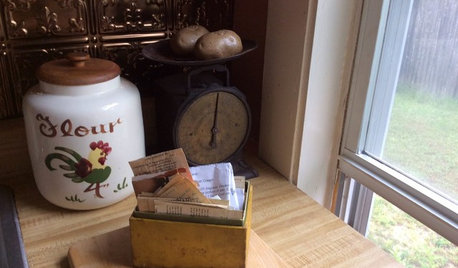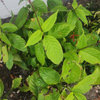A great Mustard Leaves Recipe
alexcortez
12 years ago
Related Stories

KITCHEN DESIGN5 Home Cooks Share Their Favorite Family Recipes
Peek inside the kitchens of these Houzz users and learn how to cook their time-tested, passed-down dishes
Full Story
HOLIDAYS3 Recipes for Foraged Holiday Table Decor
The coauthors of ‘The Wreath Recipe Book’ suggest 3 simple table settings you can make from materials found in the yard or at the market
Full Story
LANDSCAPE DESIGNRecipe for Modernist Edible Garden Style
Herbs, vegetables and fruit trees aren’t just for traditional gardens. Here’s how to design them into modernist landscapes
Full Story
KITCHEN DESIGNKitchen Recipes: Secret Ingredients of 5 One-of-a-Kind Cooking Spaces
Learn what went into these cooks’ kitchens — and what comes out of them
Full Story
KITCHEN DESIGNKitchen Recipes: Factory Cart Inspires a Dream Cooking Space
These homeowners' kitchen was almost nonexistent, so they whipped it up from scratch. See what they cook there and get the recipe too
Full Story
DECORATING GUIDES10 Recipes for Shabby Chic Style
Rustic furniture, floral fabrics, sparkling chandeliers. Here are 10 easy ways to bring the romantic cottage look into your home
Full Story
LANDSCAPE DESIGNRecipe for Mediterranean Edible Garden Style
The only thing better than a delicious meal outdoors is the satisfaction of growing some of the key ingredients yourself
Full Story
LANDSCAPE DESIGNRecipe for Tropical Edible Garden Style
Appeal to exotic good taste with fruit trees, palms and tropical look-alikes in your temperate-climate garden
Full Story
BEDROOMS9 Design Recipes for a Peaceful Bedroom
Find your bliss in these dreamy, relaxing sleep spaces
Full StoryMore Discussions










imagardener2
User
Related Professionals
Deer Park Landscape Architects & Landscape Designers · Aberdeen Landscape Contractors · Dallas Landscape Contractors · Fairhope Landscape Contractors · Gallatin Landscape Contractors · Lancaster Landscape Contractors · Pompton Lakes Landscape Contractors · Ponte Vedra Beach Landscape Contractors · South Hackensack Landscape Contractors · New Carrollton Landscape Contractors · Highland Springs Decks, Patios & Outdoor Enclosures · Paradise Valley Decks, Patios & Outdoor Enclosures · Denton Siding & Exteriors · San Diego Siding & Exteriors · Southampton Siding & ExteriorsalexcortezOriginal Author
alexcortezOriginal Author
User